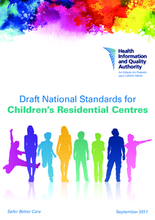Displaying 291 - 300 of 691
The Ministry of Social Welfare, Relief and Resettlement of Myanmar, with the support of UNICEF, launched a set of guidelines and minimum standards, alongside monitoring and oversight plans, aimed at bettering the lives of children in residential care.
The Ministry of Social Welfare, Relief and Resettlement of Myanmar, with the support of UNICEF, launched a set of guidelines and minimum standards, alongside monitoring and oversight plans, aimed at bettering the lives of children in residential care.
Ireland's Health Information and Standards Directorate has launched a public consultation on the Draft National Standards on Children's Residential Care. Once finalized, the Standards will provide a framework for the ongoing development of child-centred and effective services for children living in residential care centres. This document contains the preceding Draft Standards, eligible for feedback through 02 November 2017.
This article examines how Russian SOS Villages are undergoing foster reform, which prescribes a transition from institutional care for children deprived of parental care to family care model.
This article studies the causal factors behind the major overhaul of Russia’s system for children in substitute care that has been taking place since the late 2000’s.
This paper is the final chapter of Child Maltreatment in Residential Care, summarizing and analyzing the research presented on child maltreatment in institutions, its impact on children, and prevention and intervention strategies.
This chapter of Child Maltreatment in Residential Care describes the progression of changes in China's child care and protection policies to reduce the use of institutional care for children and increase efforts toward family strengthening and family-based models of alternative care.
This chapter of Child Maltreatment in Residential Care describes Interaction Competencies with Children – for Caregivers (ICC-C), a preventative intervention approach to improve the quality of care and reduce the incidence of maltreatment within institutional care settings in Sub-Saharan Africa.
This chapter of Child Maltreatment in Residential Care describes the history of child care institutions in the Russian Federation and the legislative changes implemented to improve the situation of children living in residential care settings.
This paper utilizes a harm-reduction framework to present best practices for improving residential care and reducing the negative effects residential care can have on children's development.




